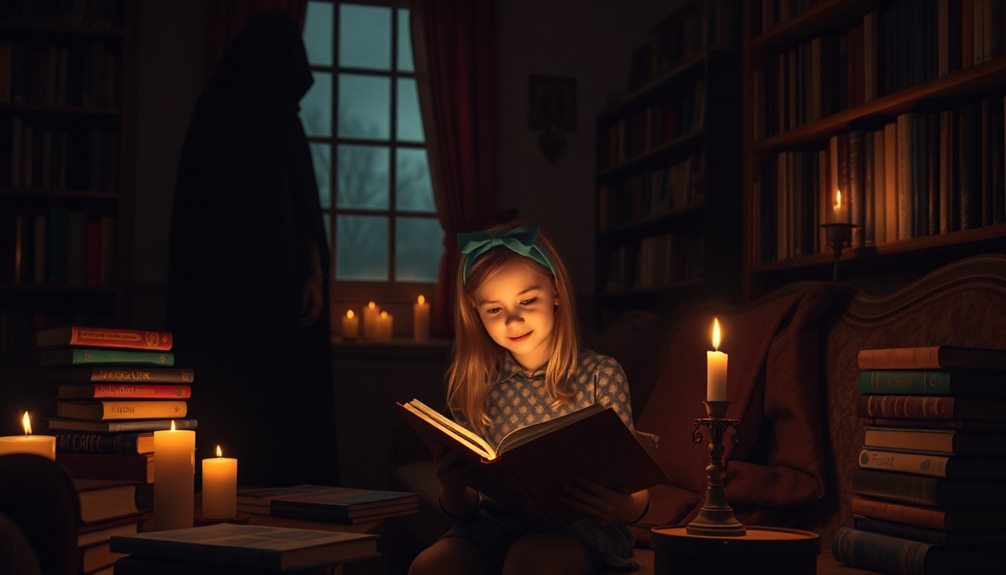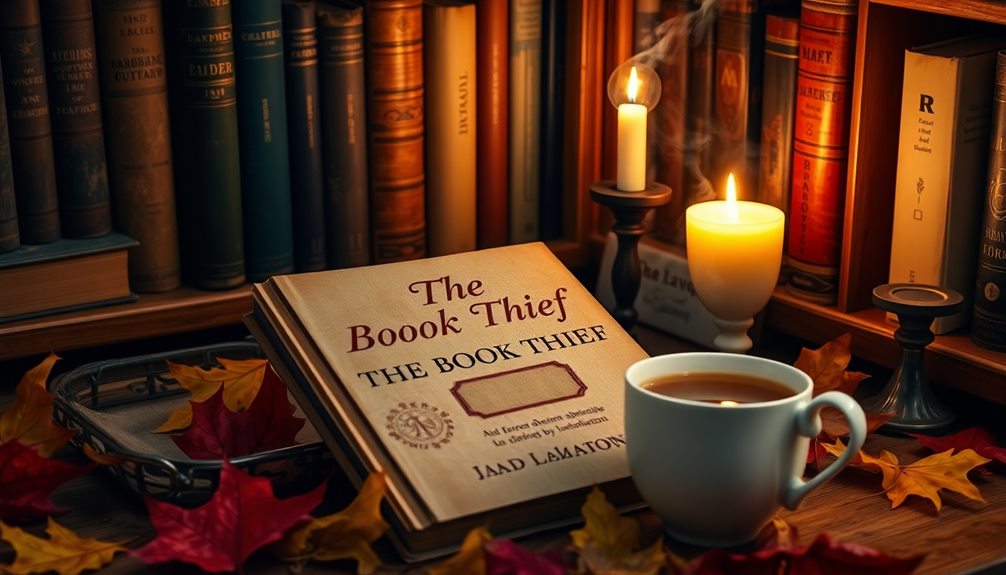Yes, 'The Book Thief' is absolutely worth your time. This powerful narrative set in Nazi Germany immerses you in the emotional experiences of Liesel Meminger. You'll connect with her journey through love, loss, and the strength of human resilience. The unique perspective of Death as the narrator adds depth and a touch of humor to the heavy themes. You'll appreciate the complex relationships and poetic language that elevate the story. If you explore further, you'll discover why this acclaimed book resonates with millions and continues to spark significant conversations about humanity and morality.
Overview of The Book Thief
Markus Zusak's "The Book Thief" immerses you in the heart-wrenching world of Nazi Germany through the eyes of Liesel Meminger, a young girl grappling with the harsh realities of war. Set during World War II, the story captures the struggles and resilience of Liesel as she navigates life in a tumultuous society, reflecting on the historical backdrop that enriches themes of defiance against evil.
You witness her pain as she loses loved ones and experiences the oppressive atmosphere of the regime.
Central to the narrative are Liesel's relationships with her foster parents, Hans and Rosa Hubermann, who provide her with love and support during these trying times. You'll also cherish her deep bond with her best friend, Rudy Steiner, whose loyalty and innocence shine amid darkness.
Another pivotal character is Max Vandenburg, a Jewish man hiding from the Nazis, whose friendship with Liesel highlights the power of words and stories in times of despair, emphasizing the importance of storytelling as a means of resistance.
Published in 2005, "The Book Thief" has sold over sixteen million copies and garnered acclaim for its haunting beauty and emotional depth.
As you read, you'll find yourself reflecting on profound historical themes that resonate across generations, making it essential reading for all ages.
Unique Narrative Perspective
One of the most striking elements of "The Book Thief" is its unique narrative perspective, delivered through the voice of Death. This unexpected narrator offers you a blend of detached overview and deep empathy, allowing you to see the characters' experiences during World War II from a unique vantage point.
Death infuses the story with dark humor and poignant observations, enriching the emotional weight while encouraging you to reflect on mortality and loss. Much like Louis Zamperini's survival story in Unbroken, the characters face extreme adversity, showcasing the resilience of the human spirit against the backdrop of war.
The narrative structure is cleverly crafted, incorporating foreshadowing and bold statements that prepare you for significant events and the fates of characters. This creates a sense of inevitability, drawing you deeper into the story.
Through Death's voice, the novel highlights the therapeutic value of reading and the power of words, emphasizing how they help characters cope with the horrors of war.
This distinctive narrative technique not only sets "The Book Thief" apart from traditional historical fiction but also beckons you to engage with complex themes of humanity, morality, and resilience in the face of tragedy.
You'll find that this unique narrative perspective enriches your reading experience in ways you mightn't expect.
Key Characters and Relationships

In "The Book Thief," Liesel's relationships with Max, Hans, Rosa, and Rudy shape her journey and illustrate the power of connection during tough times.
You'll see how Liesel's bond with Max highlights loyalty, while her interactions with Hans and Rosa reveal the complexities of love and care.
Plus, Rudy's role adds a layer of friendship that evolves in meaningful ways, making their stories resonate deeply.
Liesel and Max's Friendship
Liesel Meminger and Max Vandenburg share a bond that goes beyond mere friendship, rooted deeply in their experiences of loss and isolation during WWII. Max, a Jewish man hiding from the Nazis, becomes a pivotal figure in Liesel's life. Their friendship flourishes in the dim light of her foster family's basement, where Liesel reads to Max, exchanging words that carry the weight of their struggles.
This connection showcases the healing power of literature, as they find solace in each other's stories. Through shared moments of vulnerability, Liesel learns resilience. She confronts her fears, embracing love amidst the chaos of war. Max inspires her to see beyond the tragedy surrounding them, reinforcing her commitment to preserving their humanity.
Liesel's willingness to risk her safety for Max highlights the courage and loyalty in their relationship, illuminating the profound impact they've on each other. Ultimately, the friendship between Liesel and Max embodies hope in the darkest of times, reminding us that even in the face of loss, the bond between individuals can foster strength and resilience.
Their journey is a demonstration of the transformative power of love and words.
Hans and Rosa Hubermann
The Hubermann family plays an essential role in shaping Liesel's character and her understanding of love and resilience.
Hans Hubermann, Liesel's foster father, embodies kindness and patience. He provides emotional support, teaching her to read, which solidifies their strong bond. His gentle nature and willingness to risk his safety for others, like hiding Max Vandenburg, highlight the theme of moral courage during turbulent times.
In contrast, Rosa Hubermann, Liesel's foster mother, presents a strict and abrasive demeanor. Initially, you might see her as harsh, but as you explore further, you realize that her tough love reveals a profound affection for Liesel.
This complexity enriches their relationship, showcasing how love can manifest in various forms. As Liesel navigates her new life amidst the chaos of war, the dynamics with her foster parents evolve, reflecting her journey of acceptance and adaptation.
Together, Hans and Rosa illustrate the transformative power of love and family bonds, even in the harshest circumstances. Their unique ways of showing love not only help Liesel grow but also serve as a poignant reminder of the resilience of the human spirit.
Rudy's Role in Liesel's Life
Growing up in the shadow of war, Rudy Steiner becomes an indispensable part of Liesel Meminger's life, offering friendship and support that help her navigate the turbulent world around them. Their bond is characterized by playful banter and unwavering loyalty, allowing Liesel to express her love for words while facing the harsh realities of Nazi Germany.
- Rudy encourages Liesel to embrace her identity, providing a sense of normalcy amid chaos.
- Their friendship evolves into a sweet, innocent romance that highlights the complexity of young love.
- Rudy's famous request for a kiss symbolizes both innocence and the deep emotional connection they share.
- As Liesel deals with profound loss, including her brother's death, Rudy serves as her emotional anchor.
- His tragic fate becomes a vital turning point, pushing Liesel to confront her grief and resilience.
Through Rudy, you witness the power of friendship in the face of loss, making his role in Liesel's life both impactful and heartbreaking.
Their relationship not only enriches the narrative but also underscores the importance of connection during turbulent times.
Themes of Love and Loss
Amidst the backdrop of war, themes of love and loss emerge powerfully in "The Book Thief," shaping Liesel's journey as she navigates profound grief and longing. From the very beginning, you witness Liesel coping with the loss of her brother and the abandonment by her mother. This grief fuels her relationships, particularly with her foster parents, Hans and Rosa Hubermann, who embody the resilience and compassion often seen in characters from classic literature like Dickens' narratives.
Their love creates a sense of belonging, showcasing how familial bonds can flourish even in the darkest times.
Then there's the friendship between Liesel and Rudy, which embodies youthful love and joy. Their playful moments offer a much-needed respite from the harsh realities surrounding them. You can't help but feel the warmth of their connection, reminding you of the simple beauty that can exist amidst chaos.
Max Vandenburg's presence adds another layer, symbolizing friendship and sacrifice. His bond with Liesel deepens, emphasizing how love can thrive even under the constant threat of loss.
Ultimately, "The Book Thief" portrays love as a resilient force, highlighting our capacity to endure and find light within the shadows of war and tragedy.
Writing Style and Imagery

Markus Zusak's prose in "The Book Thief" captivates readers with strong imagery and emotional depth, drawing you into the innocence and complexity of childhood during wartime. His writing style stands out due to its poetic language and unique narrative techniques, such as stories-within-stories and foreshadowing.
These elements not only enrich the narrative but also keep you engaged as you navigate through the plot. The intricate plots and dynamic character development found in epic quests and magical domains resonate with readers, enhancing the overall experience.
- Vivid descriptions create unforgettable visuals, making you feel present in the scenes.
- A blend of humor and hope lightens dark themes, allowing for a nuanced reading experience.
- The book's structure, featuring larger fonts and short paragraphs, encourages reflection and appreciation.
- Comparisons to authors like Barbara Kingsolver highlight Zusak's distinctive voice.
- Emotional depth resonates through the characters' journeys, making their struggles relatable.
Zusak's imagery and narrative techniques enhance your emotional connection to the story, reminding you of the power of words in conveying complex experiences. His ability to balance light and dark elements guarantees that you won't just read the book—you'll feel it.
Reception and Impact
Since its release, "The Book Thief" has made a remarkable impact on both readers and the literary community. Selling over sixteen million copies worldwide, it's clear that this novel resonates deeply with a diverse audience. Many consider it a must-read in Young Adult literature, particularly due to its emotional depth and mature handling of serious themes.
Similar to how Bigger Thomas embodies struggles in Richard Wright's "Native Son," the characters in "The Book Thief" navigate complex societal issues that enhance the narrative's emotional weight.
The book gained significant recognition in the 2010s, especially after the successful film adaptation in 2014, which further broadened its reach. Discussions about "The Book Thief" frequently pop up among English majors and book enthusiasts, emphasizing its relevance in literary conversations.
Critically acclaimed, it often finds itself at the center of meaningful discussions on literature and history, showcasing its capacity to engage readers across different age groups.
If you're pondering whether this book is worth reading, its impact on the literary landscape and its ability to inspire thoughtful dialogue should certainly sway your decision.
"The Book Thief" isn't just a story; it's a powerful exploration of humanity that leaves a lasting impression, proving that it's a worthwhile addition to any reading list.
Historical Context and Relevance

Set against the harrowing backdrop of Nazi Germany during World War II, "The Book Thief" immerses readers in a period marked by oppression and despair. The novel offers a poignant exploration of the Holocaust, illustrating not just the horrific realities of this dark chapter in history, but also the moral dilemmas faced by individuals trying to survive.
Through Liesel Meminger's eyes, you see how literature and storytelling emerge as acts of resistance against tyranny and sources of hope. This reflects the extraordinary courage demonstrated by individuals in resistance movements, showcasing how collective action and unity can challenge oppressive regimes, much like the bravery of ordinary individuals during that time.
Key elements that enhance the historical context include:
- The portrayal of friendship and love amid loss, highlighting human connections.
- Themes of resilience that reflect the strength of the human spirit during catastrophic events.
- The moral complexities individuals grapple with under oppressive regimes.
- The significance of the written word as a tool for liberation.
- The ongoing relevance of the story in discussions about history, morality, and empathy.
Reading Experience and Engagement
When you pick up 'The Book Thief', be ready for an emotional journey that unfolds gradually.
The themes of love, loss, and the struggle against oppressive systems resonate similarly to Tita's fight for independence in *Like Water for Chocolate* a journey of self-discovery.
You might find yourself needing to slow your pace, allowing the rich storytelling to resonate deeply.
As you engage with its blend of humor and sadness, the reflective experience can transform your initial impressions into a profound connection with the characters and their struggles.
Emotional Engagement Levels
Many readers find that their emotional engagement with 'The Book Thief' evolves considerably as the story progresses. Initially, you might feel a bit disconnected or even bored, but as you explore deeper, the richness of the characters and their development pulls you in.
This journey often leads to profound emotional responses, leaving you laughing one moment and teary-eyed the next.
Here are some aspects that contribute to this emotional engagement:
- Dynamic Character Development: You witness characters growing and changing, making them relatable and compelling.
- Blend of Humor and Sadness: This juxtaposition enhances your reading experience, allowing for moments of relief amidst the heaviness.
- Favorite Character Connection: You might find yourself deeply attached to characters like Liesel or Max, feeling their struggles and triumphs intimately.
- Distinctive Writing Style: The poetic language and short chapters keep the narrative engaging and digestible.
- Commitment Required: Dedicating time to the story allows you to fully appreciate its emotional depth.
Ultimately, 'The Book Thief' offers a rewarding experience, transforming your initial impressions into a heartfelt connection with its characters and themes.
Reading Pace Considerations
Steering the reading pace of 'The Book Thief' is essential for fully immersing yourself in its emotional landscape. This isn't a quick read; it demands a time commitment to appreciate its depth. Many readers suggest setting aside at least an hour for your initial sessions to engage with the narrative fully.
While some early chapters may feel slow or challenging, you'll find that the story picks up, pulling you into its enchanting world. The book's larger font and short paragraphs make it accessible, encouraging you to savor the content rather than rush through it.
It's one of those good books that really benefits from a thoughtful approach. Taking breaks during your reading can also help you avoid feeling overwhelmed, allowing for deeper reflection on its emotional themes.
Despite mixed reviews on pacing, a significant number of readers believe 'The Book Thief' is definitely worth your time, as it elicits laughter, tears, and profound thoughts.
Reflective Reading Experience
Reading 'The Book Thief' isn't just about turning pages; it's about engaging deeply with the story and its themes. You'll find that the narrative invites a reflective reading experience, urging you to pause and contemplate the emotions it evokes.
As you immerse yourself in the text, you'll likely encounter moments that resonate profoundly, pushing you to laugh, cry, and think about the human condition.
To enhance your reading journey, consider these points:
- Dedicate at least an hour for your first session to immerse yourself.
- Allow the pacing to unfold naturally; the slow build-up is intentional.
- Embrace the poetic language and structure; savor each sentence.
- Take breaks when needed to absorb the emotional weight of the story.
- Reflect on how the themes relate to your own experiences.
Ultimately, 'The Book Thief' offers an emotional depth that transforms your reading into a rich, engaging experience. You won't just read the story; you'll live it, making it a highly recommended choice for anyone ready to invest their time and heart.
Final Recommendations and Thoughts

"The Book Thief" stands out as a powerful narrative that deserves your attention. This novel is more than just a story; it's an emotional journey that everyone should read.
You'll find that the character development is exceptional, allowing you to connect deeply with the inhabitants of Molching during WWII, much like how Hazel Grace and Augustus create emotional bonds in the depth of connection they share despite their struggles.
While the pacing may start slow, don't be discouraged. If you invest your time, you'll shift from initial boredom to being utterly engrossed in the plot.
What truly sets the Book Thief apart is its unique narrative style, with Death as the narrator. This creative choice not only enhances the storytelling but also adds layers of meaning that resonate with readers on multiple levels.
The themes of loss, love, and morality are explored with a depth that makes it one of the best books in Young Adult literature.
Conclusion
In the end, "The Book Thief" is like a beautifully woven tapestry, rich with emotion and depth. Its unique perspective and memorable characters pull you into a world where love and loss intertwine seamlessly. You'll find yourself reflecting on the power of words and the human spirit long after you've turned the last page. If you're looking for a read that resonates, this novel is definitely worth your time and heart.



